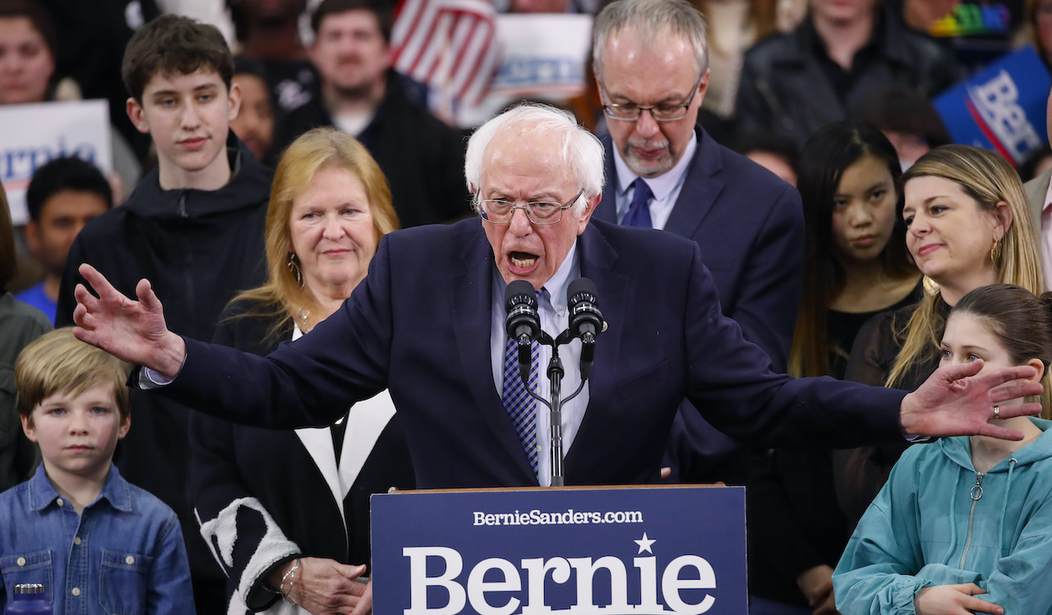In recent interviews, Bernie Sanders has explicitly declined to spell out the costs of his jaw-dropping agenda, let alone how he proposes to pay for them. This exchange with Anderson Cooper on 60 Minutes got a good deal of attention in particular, as it should have. Perhaps feeling heat for more details -- as Elizabeth Warren did ahead of this disastrous misstep -- Team Sanders released a new list of hypothetical 'pay-fors.' Rather than settling the overall question, however, the campaign memo only highlights the unseriousness and recklessness of what the Vermont Socialist is promising on the trail. The nonpartisan estimates of the total ten-year price tag of the Sanders agenda range from $60 trillion to $97 trillion.
Analysts from across the ideological divide have looked at the arithmetic and found it...severely wanting, featuring revenue-to-spending shortfalls in the tens of trillions of dollars. Writing at the Daily Beast, conservative budget expert Brian Riedl lays out the stark, unforgiving math and juxtaposing Sanders' "fact sheet" fantasies with harsh mathematical reality:
My new op-ed: Bernie Sanders' new "fact sheet" claims to pay for all his spending. But his $42 trillion in offsets cover less than half of his $97 trillion agenda.
— Brian Riedl ?? (@Brian_Riedl) March 2, 2020
And much of the $42 trillion fails basic economics, arithmetic -- and the laugh test. https://t.co/Et6pIm1PGP
Riedl begins by laying out how he arrived at the $97 trillion figure, based on Bernie's campaign promises and rhetoric. Then he takes Bernie's 'pay for' list at face value and determines that even if perfectly implemented, it represents just "$42 trillion over the decade—which covers less than half of the spending under his plan." And, unsurprisingly, much of that figure is wildly implausible:
Much of the $42 trillion in listed savings are an illusion. Sanders assumes $3 trillion can be raised from the fossil fuel industry—which reflects nearly all their profits, and exceeds the market cap of the entire energy industry. Sanders proposes expanding the Power Marketing Administrations (which provide electricity to portions of the country), converting them to higher-cost clean energy, and setting consumer prices high enough to still raise a staggering $6.4 trillion to finance the Green New Deal. Corporate tax revenues would triple (including the fossil fuel provisions). His estimated wealth tax revenues are 50 percent above those of the Penn-Wharton estimates. Sanders’ $2.4 trillion in financial transactions tax revenues are more than triple those deemed plausible by the CBO and the Tax Policy Center...
Independent analysts estimate that a 70 percent tax rate on income over $10 million would raise just under $300 billion over the decade—yet Sanders somehow assumes a 52 percent tax rate would raise $700 billion. Any credible economist will assert that raising taxes by $30 or $40 trillion would substantially harm entrepreneurship and economic growth, which would dampen the new revenues. Instead, Sanders assumes that these taxes would bring a burst of new economic growth that saves $3.6 trillion over the decade from new tax revenues and less need for safety net spending. No economic analysis is provided defending these extraordinarily unconventional assumptions. Additionally, the campaign estimates seem to simply ignore much of the revenue lost to the interactive effects of piling various new taxes on top of each other.
In conclusion, Riedl wraps up with this bit of understatement: "Realistically, the campaign remains more than $50 trillion short of paying for its promises...Sanders still has not satisfactorily answered how he would pay for democratic socialism." Who, on the Democratic side, is able to prosecute this case directly and effectively? Pete Buttigieg seemed like the most focused of the bunch on these issues at recent debates, but he's out. Amy Klobuchar has also spotlighted the math, but she's also gone. Joe Biden has attempted to hit Sanders on the costs associated with his agenda, but despite his huge Super Tuesday performance, Grandpa Joe isn't exactly great with numbers. And the numbers, especially on huge across-the-board tax increases, are staggering.
Perhaps Michael Bloomberg could redirect his enormous financial cannons away from blasting voters with ads about himself, in favor of inundating the electorate with information about how irresponsible and unrealistic Bernie's radical plans are? Maybe the billionaire will reassess his spending priorities now that Super Tuesday is behind us, especially if he flops in the critical delegate count category. While you're thinking about Sanders' avalanche of "free" stuff, bear in mind that many of the taxpayer-funded giveaways he's agitating for would end up disproportionally benefiting the well-off. I'll leave you with the latest example of the hard left rallying around Bernie as the 2020 nominating contest is a two-man race:
Recommended
JUST IN: The progressive group @DFAaction founded by Howard Dean has officially endorsed @BernieSanders for President. Sanders was the overwhelming pick of the members winning 79% of the vote to @EWarren's 13%.
— Ryan Nobles (@ryanobles) March 2, 2020

























